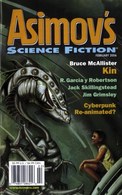
| Editor: | Sheila Williams |
| Issue: | Volume 30, No. 2 |
| ISSN: | 1065-2698 |
| Pages: | 144 |
This issue has more than an average amount of non-fiction, including a very interesting article on audio books from James Patrick Kelly and a good, quick overview of Japanese anime and manga. Peter Heck's book column was a disappointment, though; he reviewed six books, including one seriously flawed one (Jack Williamson's The Stonehenge Gate) without any substantive mention of flaws. This makes me not want to trust his book reviews in the future. I think I'm not going to have a lot of reading tastes in common with someone who didn't find the style and characterization of The Stonehenge Gate at least worth mentioning as problematic.
There are a few misses in the story selection this month, but several that I particularly enjoyed, averaging out to something slightly better than the median.
"Under the Graying Sea" by Jonathan Sherwood: The best story of the issue is the first. This story has a classic hard science fiction premise: mankind has developed a wormhole technology that will allow us instant travel to the stars, provided that we can get the end of a wormhole there. An elite group of pilots take supply ships through the stretching wormhole to maintain the fragile far end during its long journey, accelerating as quickly as possible to reduce the drag on the remote end. But on Tessa's trip, something goes horribly wrong, and she has to make some very difficult decisions. Mostly a well-constructed engineer with a wrench story with interesting technology, but some nice touches of characterization add more human feeling than is common in this genre. (8)
"Change of Life" by Kat Meltzer: A wryly sarcastic poke at the embarassed, hidden way "female problems" are dealt with crossed with a parody of catgirl fiction, this one was a lot of fun. Most of the enjoyment is in the setup and concept, mixing menopause with turning into a catgirl. Some of the more direct humor was too blatant, but the idea was well-executed and had plenty of bite. (7)
"Are You There" by Jack Skillingstead: People who use instant messaging are creepy anti-social people who avoid human contact by putting barriers between them and real human contact. People who form relationships that way are psychologically broken, and of course would love to have a relationship with the imprint of a dead woman who only exists in chat. Bleh. There's a subplot about a serial killer, but mostly this is yet another dysfunctional Internet relationship story with far too many idiotic stereotypes. (4)
"The Hastillan Weed" by Ian Creasey: An interesting look at the environmental impact of aliens from a ground-level perspective. The protagonist is a volunteer coordinator who tries to keep up public parks, including rooting out invader plants that threaten to starve out native species. This time, he's dealing with a plant imported by the ambassadors from an alien race, and one of the aliens is there helping. A good portrayal of the tedium and frustrations of environmentalism at the hard work level, with a nice SF twist, an amusing bit of unversality between human and alien, and some nice pokes at how the most passionate often do the least. (7)
"Unbending Eye" by Jim Grimsley: A man is brought back to life years after his death in a strange medical facility, the only case to be successful. He has a strangely flat affect and never sleeps. The scientists experiment on him. Eventually he escapes. End of story. I think there was a point here that I completely missed, beyond just the obvious point that when he was resurrected, not everything came back. If so, I missed it, and the story was annoying enough to read (the character is narrating with that same flat affect) that I didn't care to look harder. (3)
"Kin" by Bruce McAllister: A young boy hires an alien assassin to force the government to let his parents keep his new sister, in violation of the limits on children. The appeal is in the psychological connection between the boy and the alien: a little unrealistic, but the alien's appreciation of the boy's understanding is contageous. (6)
"Teen Angel" by R. Garcia y Robertson: This is another romp of a space opera, this time distinctly R-rated. The protagonist is a beautiful woman long-ago kidnapped by slavers and now the personal pet of the head of a slaving fleet that has just been trapped by government warships. She escapes with two child hostages, only to play deeper and deeper into the tangled plans of the slavers. Not much thematic depth, just an adventure romp, but an enjoyable one. (7)
Reviewed: 2006-07-15